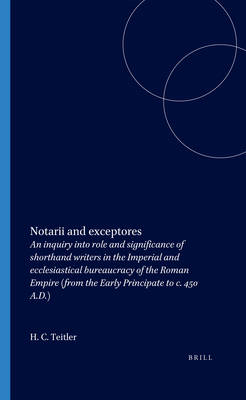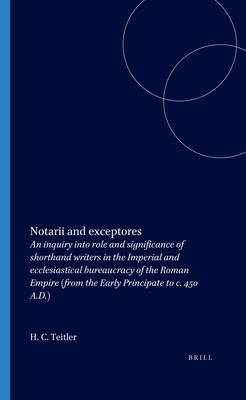
- Afhalen na 1 uur in een winkel met voorraad
- Gratis thuislevering in België vanaf € 30
- Ruim aanbod met 7 miljoen producten
- Afhalen na 1 uur in een winkel met voorraad
- Gratis thuislevering in België vanaf € 30
- Ruim aanbod met 7 miljoen producten
Zoeken
Notarii and Exceptores
An Inquiry Into Role and Significance of Shorthand Writers in the Imperial and Ecclesiastical Bureaucracy of the Roman Empire (from the Early Principate to C. 450 A.D.)
Hans C Teitler
€ 164,95
+ 329 punten
Omschrijving
In 411 AD an ecclesiastical conference was held in Carthage under the presidency of Flavius Marcellinus, tribunus et notarius. On that occasion exceptores and notarii ecclesiastici acted as shorthand writers. Thus at this conference we meet three species of one genus at different stages of their development: a tribunus et notarius, a high imperial official who, despite his title, probably did not know how to write shorthand; exceptores, minor civil servants working in public offices who were certainly stenographers at the time and notarii ecclesiastici, ecclesiastical bureaucrats whose task at the Carthaginian conference was to assist the exceptores with their work, but who at other times were more like tribuni et notarii. With the situation in 411 AD as a starting point an attempt is made to sketch the role and significance of notarii and exceptores in the Roman Empire, from the Early Principate to circa 450 AD.
Specificaties
Betrokkenen
- Auteur(s):
- Uitgeverij:
Inhoud
- Aantal bladzijden:
- 400
- Taal:
- Engels
- Reeks:
- Reeksnummer:
- nr. 1
Eigenschappen
- Productcode (EAN):
- 9789070265779
- Verschijningsdatum:
- 1/01/1985
- Uitvoering:
- Hardcover
- Formaat:
- Genaaid
- Afmetingen:
- 157 mm x 229 mm
- Gewicht:
- 793 g

Alleen bij Standaard Boekhandel
+ 329 punten op je klantenkaart van Standaard Boekhandel
Beoordelingen
We publiceren alleen reviews die voldoen aan de voorwaarden voor reviews. Bekijk onze voorwaarden voor reviews.








